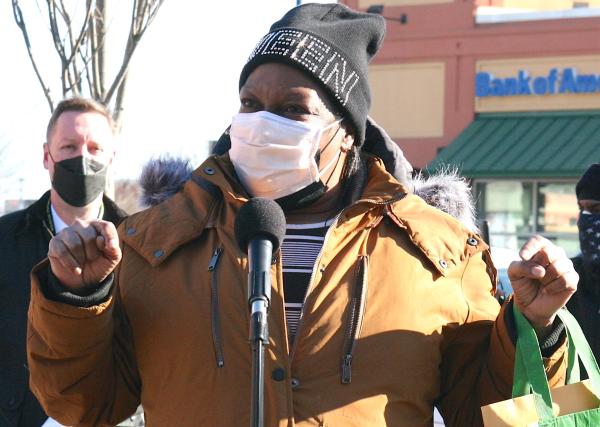February 9, 2022

Mattapan resident Peggy James said fare-free routes on Blue Hill Avenue are the “gifts that keep on giving,” and help her to do shopping and get physical therapy. (Seth Daniel photo)
Getting up Blue Hill Avenue to Grove Hall from Mattapan has never been easier for Peggy James since the Route 28 bus became free last fall. The fare-free pilot program helped the longtime Mattapan resident as she traveled to do laundry, shop for groceries and seek physical therapy.
Now it’s about to get even easier: Mayor Michelle Wu announced on Wednesday morning that three bus routes, running through Grove Hall, including the 28, would be free for two years starting March 1.
Staging a press conference in the heart of Grove Hall, Wu and a cadre of city and MBTA officials announced that Routes 23, 28, and 29 would be fare-free in a pilot adds an additional two years to the already-free Route 28 and two years for Routes 23 and 29.
“This shows how much is possible when you take down barriers for people,” said Wu.
“We know public transit is a public good and should be funded that way,” she continued. “For all of those that have rallied to fight fare hikes…and anyone who has worried how to pay for food or housing while also paying for public transit, today we show how much we can do when we take those barriers down. Transportation connects us…It’s the single fastest way to achieve our goals in Boston.”
Wu added that the initial numbers from the Route 28 fare-free pilot will be available in about two weeks – a full evaluation. She hinted that results have shown it is working the way it was advertised, saying ridership has surged on the Route 28 to 90 percent of pre-pandemic levels or to about 12,000 daily riders.
“We’ve seen it work in the pandemic and we’ve seen it work on the 28 bus,” she said of the Pilot program, before relaying the same news in Spanish.
The two-year program will be funded by $8 million in federal ARPA monies, which were approved by the City Council for this purpose in December.
For Mattapan’s James, it means an easier and happier day trekking along the Blue Hill Avenue corridor.
“It’s the gift that keeps giving,” she said. “It also makes the bus calm and there are no hassles. Sometimes when you have to wait in line to get on or wait for a person to get out money, people can get upset. It’s those little things that can turn a person’s day sour and then they can put that back on you…These free routes are the critical ones for me because this is where I need to go.”
Added Jascha Franklin-Hodge, Wu’s chief of streets: “This sends a message that this bus is for you – and it’s for anyone trying to get where they need to go.”
Franklin-Hodge said that numbers from the Route 28 pilot show that free-fare buses have a 20 percent reduction in boarding time, and that adds up over a day to quicker routes and more reliability for those that depend on the bus to be on time.
The sustainability of the fare-free buses does face some challenges beyond the two-year pilot.
MBTA General Manager Steve Poftak said Boston has become a good municipal partner in stepping up to improve service by funding initiatives and rolling out plans in conjunction with the MBTA. That’s something pioneered by the city of Everett several years ago and picked up by Boston shortly after. In short, if a municipality wants better MBTA service, the quickest way to paydirt is to lead the planning and foot the bill.
“To be clear and give credit where credit is due, we appreciate the City of Boston’s willingness to make this happen by providing the funding for the fares that won’t be collected during the pilot,” he said.
Mayor Wu was asked if she hoped this was a step towards making all bus routes in the MBTA free. “Absolutely,” she said.
Poftak wasn’t so resolute about a totally free MBTA.
“I think there’s important questions about funding that need to be answered,” he said. “There are some larger structural questions the mayor has been involved in and we look forward to continuing those conversations.”
Mayor Wu acknowledged to keep buses free, there will need to be funding resources delivered from state and federal elected officials.
“There’s a lot of work and leadership happening from state and federal partners to find sustainable funding,” she said. “We will need help and partnership with state and federal partners…This is very much about pouring these federal resources back into recovery and our small businesses and families’ pockets as well.”


